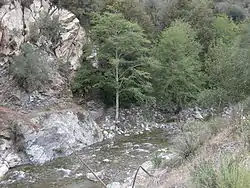East Fork San Gabriel River
The East Fork is the largest headwater of the San Gabriel River in Los Angeles County, California. It originates at the crest of the San Gabriel Mountains in the Angeles National Forest, at the confluence of the Prairie Fork and Vincent Gulch near Mount Baden-Powell. It then flows south and west for 17 miles (27 km)[3] to San Gabriel Reservoir, where it joins with the West Fork San Gabriel River. Although the East Fork is colloquially considered a separate river (to distinguish it from the West Fork), the U.S. Geological Survey officially lists the East Fork as the upper part of the main stem San Gabriel River,[1] a fact is shown by topographical maps of the area.
| East Fork San Gabriel River | |
|---|---|
 | |
 Location of the East Fork in California | |
| Location | |
| Country | United States |
| State | California |
| Physical characteristics | |
| Source | San Gabriel Mountains |
| • location | Angeles National Forest |
| • coordinates | 34°20′35″N 117°43′30″W[1] |
| • elevation | 4,483 ft (1,366 m) |
| Mouth | San Gabriel River |
• location | San Gabriel Reservoir |
• coordinates | 34°14′23″N 117°51′24″W[2] |
• elevation | 1,473 ft (449 m) |
| Length | 17 mi (27 km)[3] |
| Discharge | |
| • location | Near Camp Bonita[4] |
| • average | 72.3 cu ft/s (2.05 m3/s)[4] |
| • minimum | 2.28 cu ft/s (0.065 m3/s) |
| • maximum | 46,000 cu ft/s (1,300 m3/s) |
The major tributaries of the East Fork, from upstream to downstream, are the Prairie Fork, the Fish Fork (which rises near Mount San Antonio/Mount Baldy, the highest summit in the range), the Iron Fork and Cattle Canyon. The "Narrows" of the San Gabriel River is the deepest river gorge in the San Gabriel Mountains, flowing as much as 6,000 feet (1,800 m) below the nearby peak of Iron Mountain. Much of the upper half of the river is within the Sheep Mountain Wilderness.
A major point of interest on the East Fork is the Bridge to Nowhere, a 120-foot (37 m) high concrete arch bridge that was once part of the East Fork Road before the rest of the road was destroyed by flooding in 1938.[5] The East Fork Road was originally intended to connect the Los Angeles Basin to the Angeles Crest Highway, but was never completed due to the high cost of cutting and tunneling through the rugged East Fork Canyon. A later attempt to build a road through the East Fork via Shoemaker Canyon, in the 1950s, was also aborted due to lack of funds.
Today the East Fork Road provides access to the Heaton Flats trailhead, a popular jumping-off points for visitors to the San Gabriel Mountains.[6][7] The stretch of the river along and above East Fork Road is one of the most heavily used parts of the Angeles National Forest, and is visited by hikers, campers and recreational gold miners alike – as many as 15,000 per day in the summer, which has had considerable environmental impacts on the East Fork.[8]
See also
References
- "San Gabriel River". Geographic Names Information System. United States Geological Survey. 1981-01-19. Retrieved 2016-12-05.
- "West Fork San Gabriel River". Geographic Names Information System. United States Geological Survey. 1981-01-19. Retrieved 2016-12-05. Note: GNIS does not provide coordinates for the East Fork San Gabriel River mouth, as it considers the East Fork to be part of the main stem. The coordinates and elevation for the terminus of West Fork and East Fork are identical.
- "USGS National Atlas Streamer". United States Geological Survey. Archived from the original on 2014-05-28. Retrieved 2016-12-05.
- "USGS Gage #11080500 on the East Fork San Gabriel River near Camp Bonita, CA: Monthly Statistics". National Water Information System. U.S. Geological Survey. 1932–1979. Retrieved 2016-12-05.
- McKinney, John (1987-08-08). "Nature's Visual Treasures in San Gabriel River's East Fork". Los Angeles Times. Retrieved 2016-12-05.
- "Heaton Flats Trail in the San Gabriel Mountains". Hikespeak. Retrieved 2016-12-05.
- "Heaton Flats Trailhead". U.S. Forest Service. Retrieved 2016-12-05.
- Sahagun, Louis (2012-09-30). "An alpine creek that reeks: Budget cuts hinder law enforcement along San Gabriel River". Los Angeles Times. Retrieved 2016-12-05.